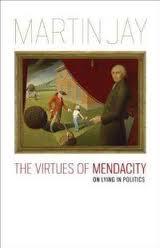Berkeley Books: The Virtues of Mendacity: On Lying in Politics by Martin Jay

In the last fifty years, lying has come to occupy an increasingly central position in U.S. American political discourse, so that, from the lies of politicians and the moral outrage they provoke, new relationships seem to be developing between mendacity and politics. With the Bush administration's deceptions about weapons of mass destruction in Iraq came a new sense of urgency regarding lies and politics--one that arguably moved many academics to rethink a tradition of flexibility with regards to the truth; or rather, of acknowledging the dissimulations inherent to narrative, and the relativity of truth itself.
This month’s Berkeley Books selection, The Virtues of Mendacity: On Lying and Politics by Sidney Hellman Ehrman Professor of History Martin Jay, departs from this recent embrace of truth to offer a nuanced reading of the the enmeshment of lies and politics. Jay examines writing on lies from Plato and St. Augustine to Hannah Arendt and Leo Strauss to show that each philosopher’s position on lying corresponds to a particular conception of the political. He then uses this insight to explore to a variety of contexts and questions about lying and politics, and concludes by suggesting that lying in politics may not be so bad; that political hypocrisy may be the best alternative to the violence justified by those who claim to know the truth.
Allan Megill, Professor of History at the University of Virginia, writes of The Virtues of Mendacity: "It is possible that this is Jay's best book. In any case, it will surely become a primary reference point for anyone who wants to think seriously about lies and lying."
For the title of Jay's best book, the competition is fierce: his numerous publications comprise seminal works of 20th century intellectual history such as The Dialectical Imagination: A History of the Frankfort School of Social and the Institute of Social Research, 1923-1950 (1973), Downcast Eyes: The Denigration of Vision in Twentieth Century French Thought (1993), and Songs of Experience: Modern American and European Variations on a Universal Theme (2006).
In addition to the 2010 Virtues of Mendacity, the University of Virginia press just published Essays from the Edge Parerga and Paralipomena, a collection of Jay's writings on methodological debates in the humanities and social sciences including the limits of interdisciplinarity, the issue of national or universal philosophy, cultural relativism, visuality, and the implications of periodization in historical narrative.
In this week’s Biblio-file, Jay recommends nine books that shaped his thinking while working on The Virtues of Mendacity. His selections comprise a range of disciplinary approaches to lying—from sociobiologist David Livingstone Smith’s Why We Lie: The Evolutionary Roots of Deception and the Unconscious Mind to Herald Weinrich’s The Linguistics of Lying and Other Essays, to theorist Jean Michel Rabaté’s The Ethics of Lying—as well as diverse historical perspectives—from Alekander Koyré “The Political Function of the Modern Lie,” first published in the Modern Jewish Record in 1945 to Eric Alterman’s 2004 monograph When Presidents Lie: A History of Official Deception and its Consequences.